Sea of Stars and the Jordan Peterson thing
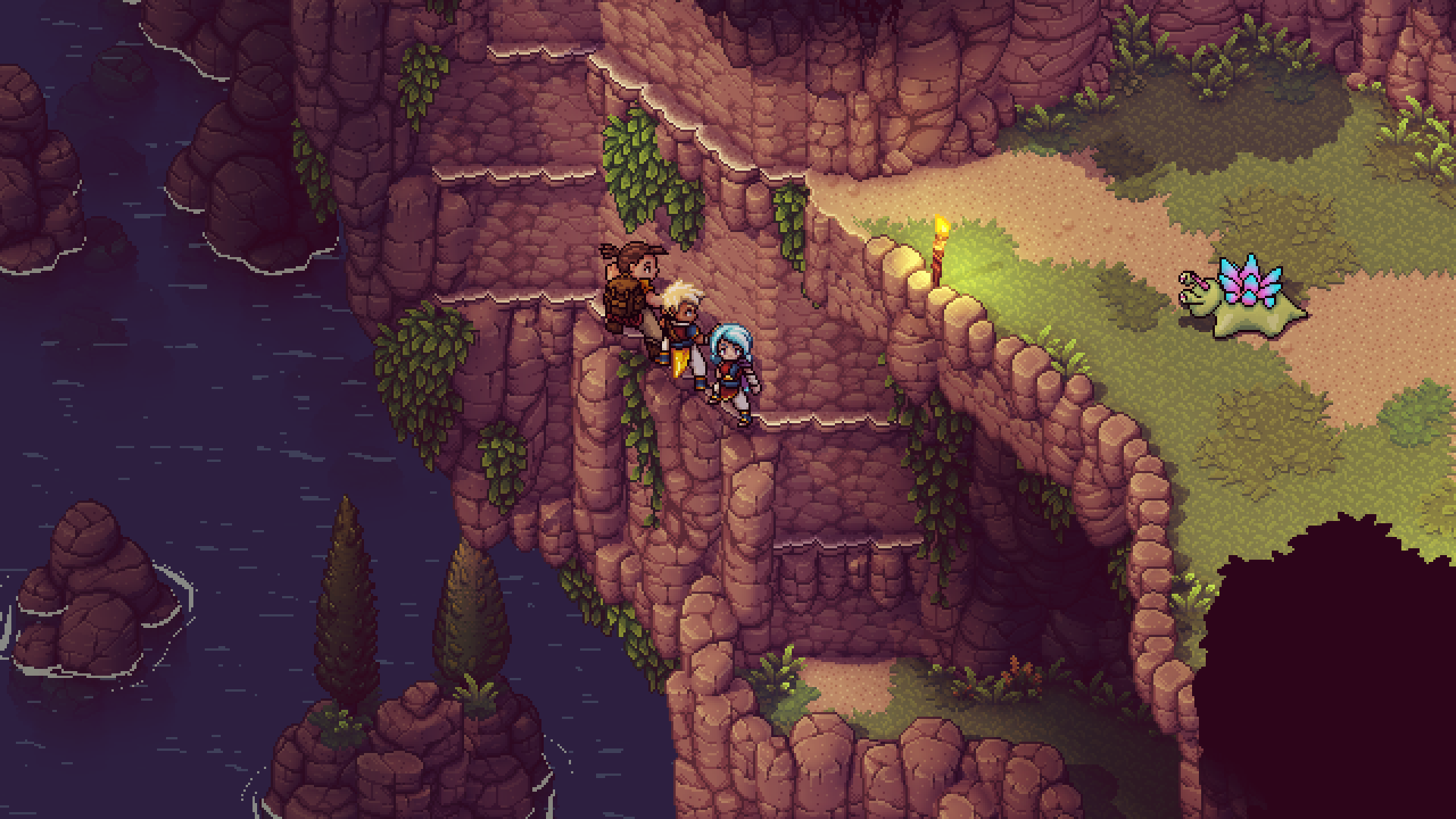
When I first saw a preview for Sabotage Studio’s Sea of Stars a few years ago, I figured I was in heaven. Here was a detailed, carefully curated turn-based RPG from a Canadian developer specifically citing many of my favourite games as inspirations. Chrono Trigger? Check. Illusion of Gaia? Check. Symphony of the Night? Check. It was, quite literally, a game made specifically for me. I was so excited, I reached out to the game’s creative director and writer, Thierry Boulanger, for a feature on Insert Cartridge, and wrote about the game in my book, Fight, Magic, Items: The History of Final Fantasy, Dragon Quest, and the Rise of Japanese RPGs in the West, and its important place in the wave of next generation turn-based RPGs inspired by the 16- and 32-bit golden age.
A taste of my excitement:
One of the most notable things about the level design is that they’re tightly packed. The player can often see later parts of the dungeon early on, and only through exploration or forward movement do they figure out how to proceed. There’s a labyrinthine quality to them that goes above and beyond the linear dungeons found in games like Chrono Trigger or Final Fantasy VI, without rising quite to the complexity of puzzle-based dungeons like those from Lufia 2: Rise of the Sinistrals or Wild Arms.
Boulanger specifically called out Illusion of Gaia and A Link to the Past while explaining how the team builds the world. There’s a verticality to the level design that didn’t exist in something like Chrono Trigger, and the first time you drop down from a high point while navigating a dungeon, you’ll be reminded of Will plummeting from a rooftop to the cobblestones in South Cape.
Recapturing the magic of 16-bit golden age console RPGs with modern polish, game design, and visuals feels like an impossible task, but Boulanger’s history with the genre and the pedigree of his team are impeccable. Alongside Eiyuden Chronicle, Quartet, and Chained Echoes, Sea of Stars represented the desire among fans and indie developers to return to the genre’s classical stylines, narratives, and visual identities. It’s perfect for fans like me who grew up during the 90s, and also a great opportunity to introduce new players to golden age-style RPGs.
But, then, there was the whole Jordan Peterson thing.
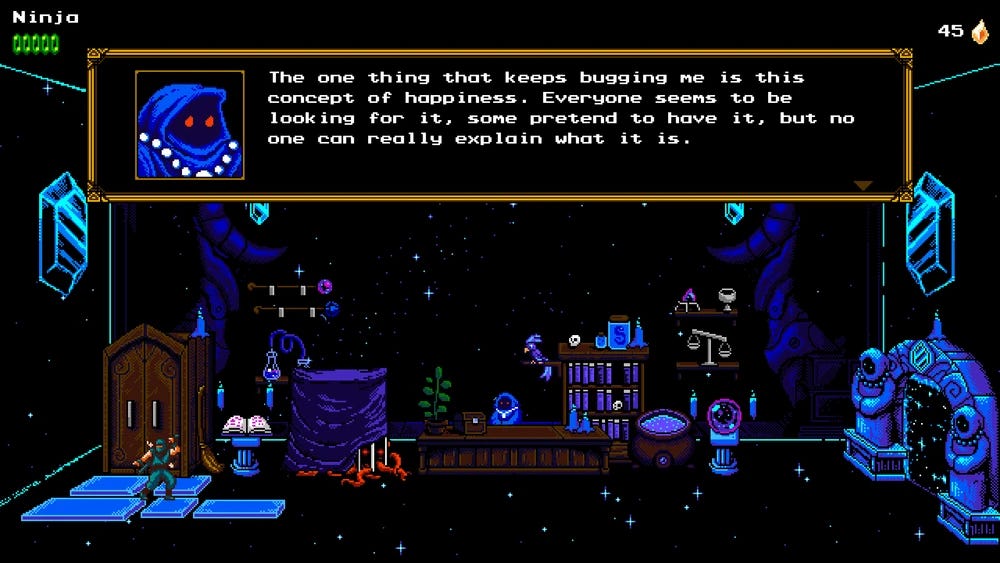
2018’s The Messenger was Boulanger and Sabotage’s debut release, and its blend of Ninja Gaiden-inspired action platforming, Metroidvania exploration, and gorgeous pixel art graphics earned it "Best Debut Indie Game" at the Game Awards.
Many players, however, noticed a series of optional “rants” from a shopkeeper named “Jordan the Wise” that seemed remarkably familiar to those who had read Peterson’s early work. Via Facebook Messenger, Sabotage confirmed that one of the three rants was “inspired” by Peterson’s work “in the hopes that more people get interested in taking on the personal growth journey.”
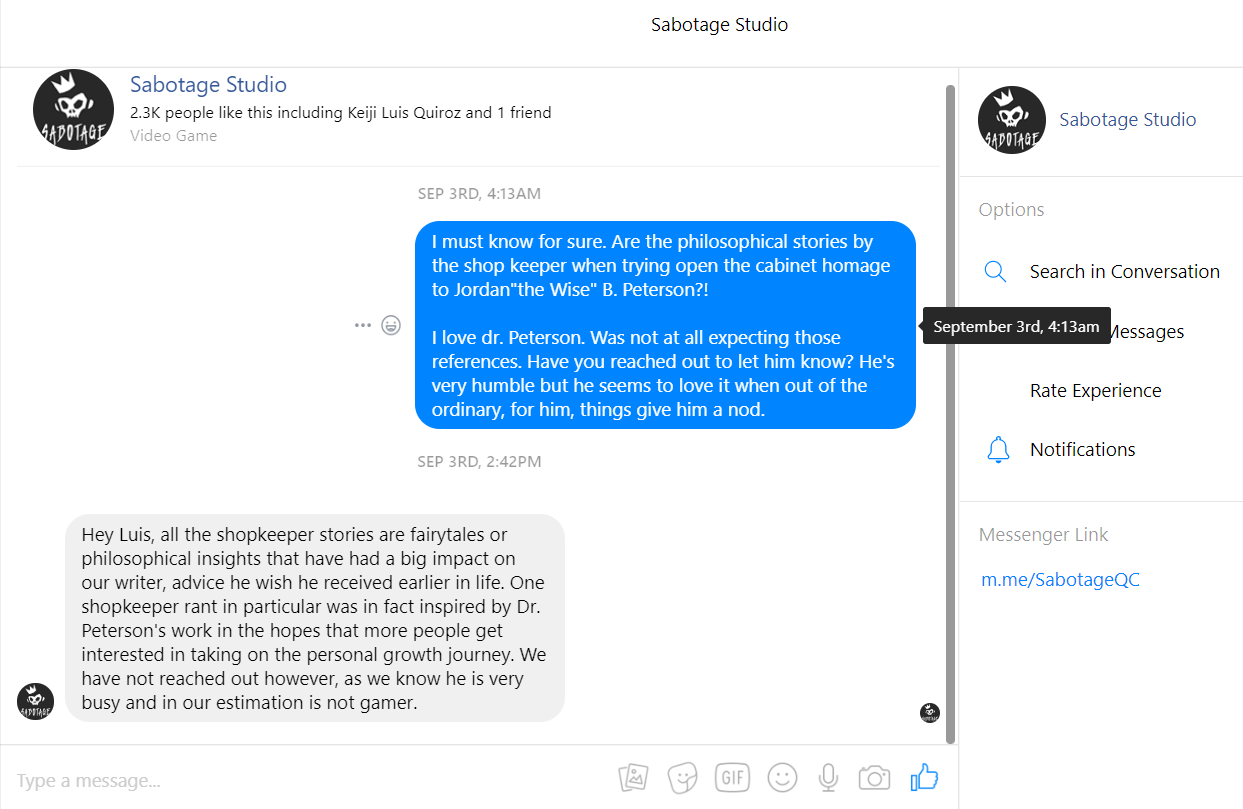
This was… disheartening, to say the least, and, frankly, took the wind out of my sails when it came to covering Sea of Stars. For as much as Sea of Stars appeals to me, any sort of story-heavy, narrative driven game idealizing the teachings of Peterson’s work is a no-go. More confusingly, however, it didn’t add up with the Thierry Boulanger who signal boosts trans fans and gender reconstruction campaigns.
As someone who covers RPGs, is an obvious and loud Chrono Trigger stan, and has profiled Boulanger and Sea of Stars in the past, I was conflicted about platforming the game here on Astrolabe, and having second thoughts about even playing it.
I wasn’t the only one.
With Sea of Stars’s release this week, and concerns about Peterson’s potential influence on the game coming to a head in various internet communities, including the official Sabotage Discord server, Boulanger directly addressed the situation on August 19, 2023.
In a public Developer Q&A thread, user “papertygrr” asked:
I'm being totally serious here, I'm interested in sea of stars but just saw a video from the messenger with a character going on a whole screed about the teachings of "Jordan the Wise" and I can't lie, it's extremely embarrassing and makes me kinda hesitant. So I'll be super straightforward and just ask if this studio is still into that type of stuff and if I can expect to be proselytized to in their new game (which looks very cool!) or if I should just skip it. It's fine for people to grow and move on from things and the messenger is old so I'm not gonna like get up in arms about it either way but I just wanna know what's up. Thanks.
“The short answer here is that this dev is definitely not into jordan peterson!” Boulanger responded.
“Back in 2004 while binging books in search for a way out of a mental health situation I won't detail here, I did read a book of his, and it did move the needle,” he further explained. Over a decade later, as Boulanger was writing The Messenger and using it as a platform to chronicle his personal struggles with mental health, he started pulling lessons that had helped him in the past. “Around that same time [Peterson] came out with absolutely horrendous views, though it was at that time still only the tip of the iceberg we know today.”
Here’s the full public exchange:
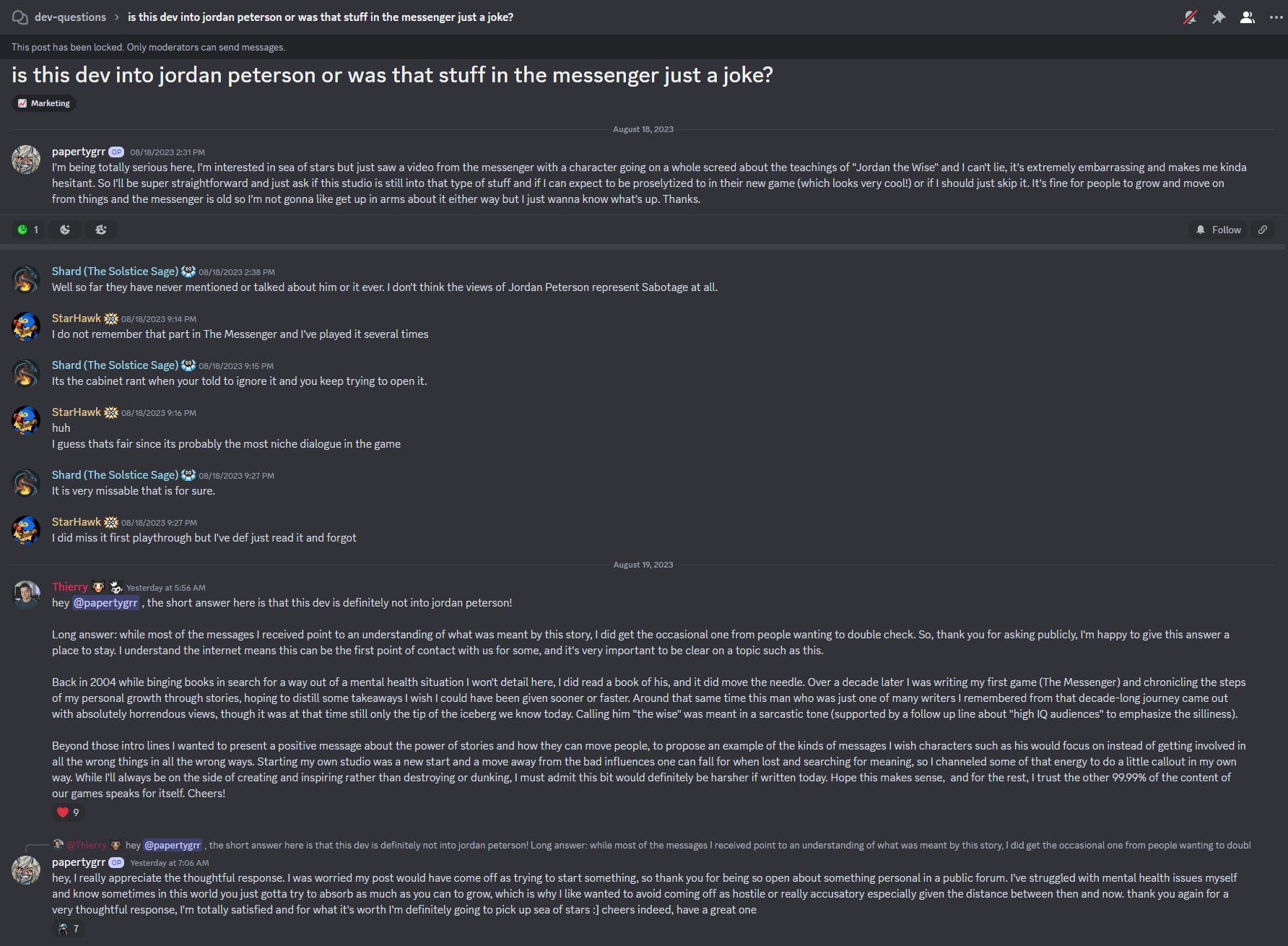
Calling him “Jordan the Wise” was meant sarcastically, though Boulanger likely underestimated a) how challenging sarcasm can be in a media environment where nobody is given benefit of the doubt, and b) just how awful Peterson would reveal himself to be by the time their next game released. Sarcasm is difficult at the best of times, especially when a writer isn’t working in their first language, and if there’s any room for misinterpretation in a joke like this, you have to be very careful. Sometimes jokes are worth writing out, but deleting before you hit publish.
“While I'll always be on the side of creating and inspiring rather than destroying or dunking, I must admit this bit would definitely be harsher if written today,” Boulanger concluded.
This sort of clear denunciation of Peterson’s work, and an explanation for how it appeared in The Messenger in the first place, is the type of response I’d been hoping to see from Sabotage and Boulanger for months now. I wish it had come sooner, but I’m pleased to be able to go into Sea of Stars without conflict.
Because, wow, does it look good.

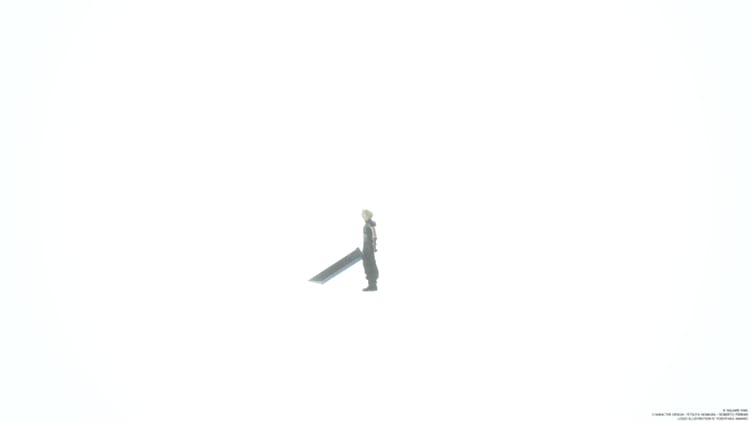

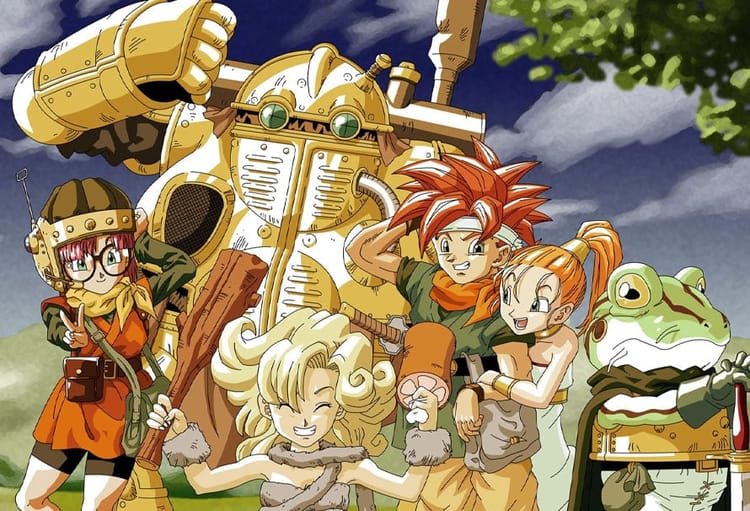

Member discussion